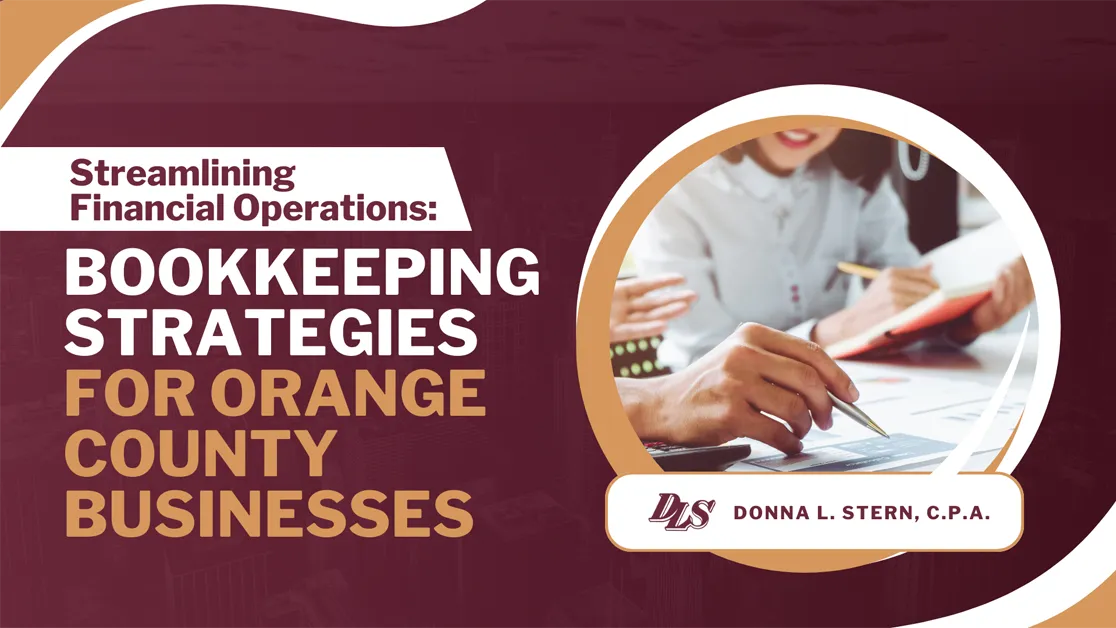Many business owners in Orange County struggle with cumbersome bookkeeping processes and feel like their finances are a tangled mess of receipts and late-night data entry sessions. If you’re one of them, here’s the good news: You can streamline your bookkeeping strategy in a few steps, which will do more than just save time (although, let’s be honest, that’s a major perk!).
By introducing more efficient financial operations, you can unlock the power of clear financial data, empowering you to make informed decisions and propel your business toward sustainable growth.
Here are 5 bookkeeping strategies you will learn in this blog:
- Setting Up a Robust Bookkeeping System
- Automating Routine Financial Tasks
- Regular Reconciliation and Reporting
- Managing Payroll and Expenses Efficiently
- Utilizing Financial Data for Business Decisions
- Working with Professional Bookkeepers
Setting Up a Robust Bookkeeping System
Having a robust bookkeeping system in place is like building a solid foundation for your business. It provides stability, clarity, and the information you need to make informed decisions that fuel growth. So, here’s what you need to do:
1. Choose Your Tools: Gone are the days of dusty ledgers. Modern bookkeeping software offers user-friendly interfaces and automation features that streamline data entry and record-keeping. Whether you choose a cloud-based platform or a desktop application, ensure it integrates seamlessly with your existing business tools for a smooth workflow.
2. Define Your Chart of Accounts: This acts as your financial roadmap, categorizing your income and expenses. Work with an accountant to establish a chart that aligns with your industry and business model. Consistency is key!
3. Establish Best Practices: Develop a system for handling receipts, invoices, and other financial documents. Implement a clear filing system (digital or physical) and set regular schedules for data entry and reconciliation. Consistency and organization are crucial for maintaining accurate, accessible financial records and meeting compliance requirements.
Remember, you don’t have to go it alone! There are numerous resources available, from bookkeeping tutorials to consultations with financial professionals in Orange County. As you invest time and effort in setting up a robust bookkeeping system, you’ll empower yourself to navigate your business toward a brighter financial future.
Automating Routine Financial Tasks
Imagine a world where data entry and reconciliation didn’t eat away at your precious time. In the realm of streamlined bookkeeping, automation tools are your secret weapons. These powerful software features can handle a surprising array of repetitive tasks for any business niche, boosting your efficiency and freeing you to focus on what truly matters: growing your business.
Benefits of automating bookkeeping:
- Effortless Data Entry: Forget manually entering invoices and receipts. Automation tools can connect to your bank accounts and credit cards, automatically pulling in transaction data and categorizing it based on predefined rules. This minimizes errors and saves countless hours spent on tedious data entry.
- Streamlined Reconciliation: Reconciling bank statements can be a time-consuming chore. Did you know that automation tools can match your bank transactions with your accounting records, highlighting discrepancies and significantly reducing the time it takes to reconcile your accounts?
- Reduced Errors: Manual data entry is prone to human error, which you probably already know from experience. Automation eliminates this risk. Enjoy effortless accuracy and integrity of your financial data. This translates into reliable financial reports and increased confidence when making financial decisions.
By leveraging automation tools for your routine financial tasks, you can streamline your bookkeeping processes, improve efficiency, and reclaim valuable time. This allows you to focus on strategic initiatives and analyze financial data for deeper insights. So, ditch the repetitive tasks and embrace the power of automation – your finances (and your sanity) will thank you for it!
Regular Reconciliation and Reporting
Your business needs accurate financial data to chart its course to success. Regular reconciliation and reporting are the tools that ensure your financial compass is always pointed in the right direction.
What do we mean by reconciliation? Financial reconciliation involves comparing your internal financial records, like your accounting software, with external sources, such as bank statements and credit card reports. This process helps identify any discrepancies, like missing transactions or errors in data entry. Addressing these inconsistencies promptly ensures the accuracy of your financial data, which is the foundation for reliable reporting.
Think of financial reports as the roadmap for your business. They provide crucial insights into your financial health, profitability, and cash flow. Regularly generated reports – monthly, quarterly, or annually, depending on your needs – help you track progress toward your goals, identify areas for improvement, and make informed decisions about resource allocation and future investments.
Wouldn’t you like to make proactive adjustments, seize opportunities, and navigate financial challenges with confidence? By prioritizing regular financial reconciliation and reporting, you gain a clear and up-to-date picture of your financial situation.
Managing Payroll and Expenses Efficiently
Payroll and expenses are two of the biggest outflows for any business. Streamlining how you manage these areas can significantly improve your cash flow and free up resources for growth. Consider these tips from expert accountants:
- Payroll Automation: Invest in payroll software that automates tasks like calculating taxes and deductions, generating paychecks, and filing payroll reports. Not only does this save you time, but it also minimizes errors and ensures timely payments to your employees.
- Categorize Expenses Proactively: Establish a clear system for categorizing business expenses. This could involve using expense tracking software or creating dedicated folders for different expense types. Consistent categorization makes expense analysis and budgeting a breeze.
- Embrace Digital Receipts: Ditch the paper trail! Utilize digital receipt capture tools that scan and store receipts electronically. Doing so eliminates the risk of losing receipts and makes expense reporting a snap.
- Regular Expense Reviews: Schedule regular reviews of your expenses. Analyze spending patterns and identify areas where you can optimize costs. Consider negotiating with vendors, exploring cost-effective alternatives, or implementing expense reduction strategies.
Implementing these tips will help you gain greater control over your payroll and expenses. This allows you to manage your cash flow more effectively, make informed budgeting decisions, and ultimately free up resources to invest in your business’s future. Remember, streamlined expense management empowers you to focus on growing and thriving!
Utilizing Financial Data for Business Decisions
Financial data is more than just rows and columns in a spreadsheet; it’s a treasure trove of insights waiting to be unearthed. Effective bookkeeping strategies allow you to gain access to this valuable data, empowering you to take control of your financial future.
Below are four ways data analysis can inform your business decisions:
Identify Growth Opportunities
Analyze sales trends, customer demographics, and profitability by product or service. Doing so can reveal hidden opportunities, such as underperforming products that require adjustments or untapped customer segments waiting to be explored.
Make Informed Investments
Financial data helps you assess the feasibility of new ventures. By analyzing projected costs, potential returns, and cash flow impact, you can invest your hard-earned money wisely for long-term growth.
Optimize Resource Allocation
Data collected by thorough bookkeeping reveals where your resources are being spent. Identify areas where expenses are outpacing value or where budget adjustments might be necessary. This empowers you to allocate resources strategically, maximizing your return on investment.
Track Progress and Adapt
Regularly monitoring financial data allows you to track your progress toward your business goals. In identifying areas where performance does not quite match your expectations, you can adapt your strategies and make course corrections as needed.
Financial data doesn’t dictate your decisions; it empowers them. By harnessing the power of effective bookkeeping strategies and utilizing data analysis, you gain valuable insights that illuminate the path toward a prosperous future for your business.
Working with a Professional CPA for Bookkeeping Solutions
Streamlining your bookkeeping doesn’t have to be a solitary journey. Consider partnering with a professional accounting consulting firm like Donna L. Stern, CPA in Orange County. We offer personalized, down-to-earth accounting and bookkeeping services for small- to medium-sized businesses.
Our decades-long expertise can help you implement efficient systems, ensure compliance, and free you up to run your business the way you want. We’ll help you navigate the financial complexities while you enjoy smoother operations and higher returns.
Invest in your financial future with our expert bookkeeping services that will streamline your business operations. Contact Donna L. Stern, CPA, today for a free consultation.


